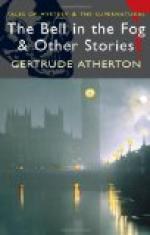“You believe in the soul as an independent entity, then—–that it and the vital principle are not one and the same?”
“Absolutely. The body and soul are twins, life comrades—sometimes friends, sometimes enemies, but always loyal in the last instance. Some day, when I am tired of the world, I shall go to India and become a mahatma, solely for the pleasure of receiving proof during life of this independent relationship.”
“Suppose you were not sealed up properly, and returned after one of your astral flights to find your earthly part unfit for habitation? It is an experiment I don’t think I should care to try, unless even juggling with soul and flesh had palled.”
“That would not be an uninteresting predicament. I should rather enjoy experimenting with broken machinery.”
The high wild roar of water smote suddenly upon Weigall’s ear and checked his memories. He left the wood and walked out on the huge slippery stones which nearly close the River Wharfe at this point, and watched the waters boil down into the narrow pass with their furious untiring energy. The black quiet of the woods rose high on either side. The stars seemed colder and whiter just above. On either hand the perspective of the river might have run into a rayless cavern. There was no lonelier spot in England, nor one which had the right to claim so many ghosts, if ghosts there were.
Weigall was not a coward, but he recalled uncomfortably the tales of those that had been done to death in the Strid.[1] Wordsworth’s Boy of Egremond had been disposed of by the practical Whitaker; but countless others, more venturesome than wise, had gone down into that narrow boiling course, never to appear in the still pool a few yards beyond. Below the great rocks which form the walls of the Strid was believed to be a natural vault, on to whose shelves the dead were drawn. The spot had an ugly fascination. Weigall stood, visioning skeletons, uncoffined and green, the home of the eyeless things which had devoured all that had covered and filled that rattling symbol of man’s mortality; then fell to wondering if any one had attempted to leap the Strid of late. It was covered with slime; he had never seen it look so treacherous.
[Footnote 1:
“This striding place
is called the ‘Strid,’
A name which it
took of yore;
A thousand years hath
it borne the name,
And it shall a
thousand more.”
]
He shuddered and turned away, impelled, despite his manhood, to flee the spot. As he did so, something tossing in the foam below the fall—something as white, yet independent of it—caught his eye and arrested his step. Then he saw that it was describing a contrary motion to the rushing water—an upward backward motion. Weigall stood rigid, breathless; he fancied he heard the crackling of his hair. Was that a hand? It thrust itself still higher above the boiling foam, turned sidewise, and four frantic fingers were distinctly visible against the black rock beyond.




